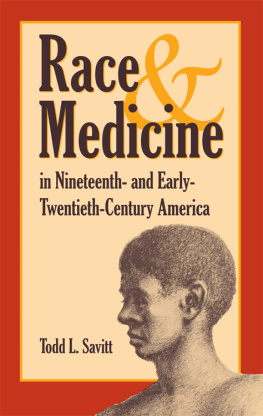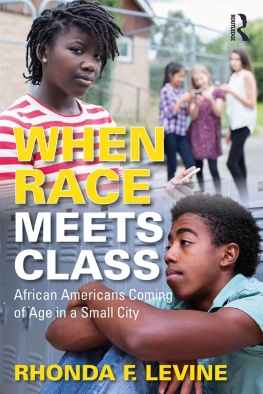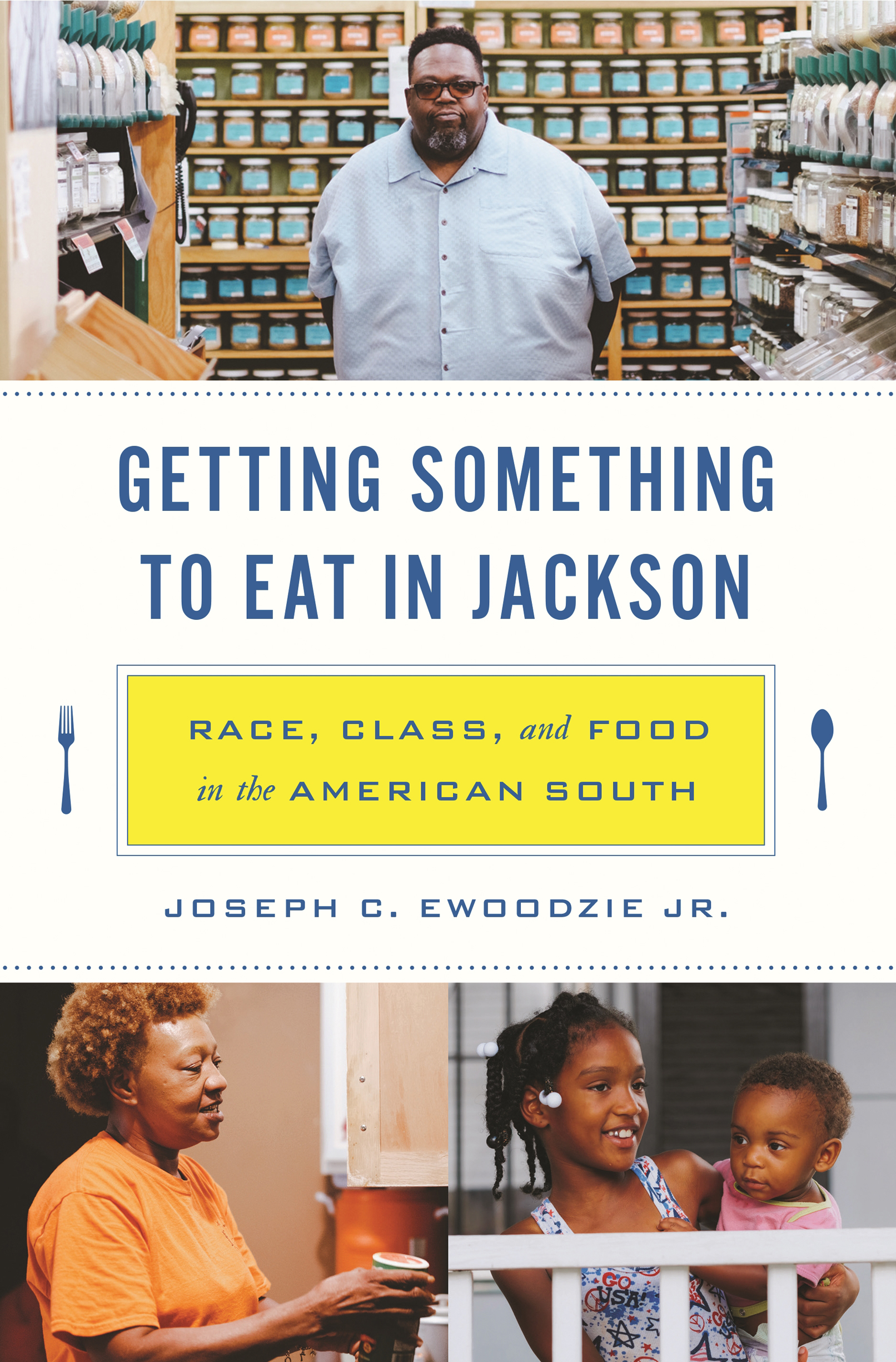GETTING SOMETHING TO EAT IN JACKSON
Getting Something to Eat in Jackson
RACE, CLASS, AND FOOD IN THE AMERICAN SOUTH
Joseph C. Ewoodzie Jr.
PRINCETON UNIVERSITY PRESS
PRINCETON & OXFORD
Copyright 2021 by Princeton University Press
Princeton University Press is committed to the protection of copyright and the intellectual property our authors entrust to us. Copyright promotes the progress and integrity of knowledge. Thank you for supporting free speech and the global exchange of ideas by purchasing an authorized edition of this book. If you wish to reproduce or distribute any part of it in any form, please obtain permission.
Requests for permission to reproduce material from this work should be sent to permissions@press.princeton.edu
Published by Princeton University Press
41 William Street, Princeton, New Jersey 08540
6 Oxford Street, Woodstock, Oxfordshire OX20 1TR
press.princeton.edu
All Rights Reserved
Library of Congress Cataloging-in-Publication Data
Names: Ewoodzie, Joseph C., Jr author.
Title: Getting something to eat in Jackson : race, class, and food in the American South / Joseph C. Ewoodzie Jr.
Description: Princeton ; Oxford : Princeton University Press, [2021] | Includes bibliographical references and index.
Identifiers: LCCN 2021016475 | ISBN 9780691203942 (Hardback : acid-free paper) | ISBN 9780691230672 (eBook)
Subjects: LCSH: Food habitsMississippiJacksonHistory. | Food securityMississippiJackson. | African AmericansFoodHistory. | Cooking, AmericanSouthern styleHistory. | Social classesMississippiJackson. | African AmericansRace identityMississippiJackson. | African AmericansMississippiJacksonSocial life and customs. | African AmericansMississippiJacksonSocial conditions. | Jackson (Miss.)Social conditions. | EthnologyMississippiJackson.
Classification: LCC GT2853.U5 E96 2021 | DDC 394.1/20976251dc23
LC record available at https://lccn.loc.gov/2021016475
Version 1.0
British Library Cataloging-in-Publication Data is available
Editorial: Megan Levinson and Jacqueline Delaney
Production Editorial: Ellen Foos
Jacket Design: Karl Spurzem
Production: Erin Suydam
Publicity: Kate Hensley and Kathryn Stevens
Text photos are by the author except for which were taken by Ethan L. Caldwell.
Jacket art: Photos by Ethan L. Caldwell; cutlery by Fourleaflover / iStock
For my ladies
Caroline, Jaden, and
Josephine
Every now and then, Grandmama sent these Mason jars of pickles and pear preserves. Or she gave us pounds of government cheese, peanut butter, and crackers near the middle of the month. Grandmama laughed and laughed until she didnt when I called the cheese Gourmet African American cheese. You tried to act too good to eat Gourmet African American cheese, but sometimes I caught you making these buttery grilled Gourmet African American cheese sandwiches with something ultrabougie like pumpernickel bread. I couldnt understand why you were so ashamed of eating like we didnt have much money
KIESE LAYMON, HEAVY: AN AMERICAN MEMOIR
CONTENTS
GETTING SOMETHING TO EAT IN JACKSON
CHAPTER ONE
Getting Something to Eat
JONATHAN TOLD ME to come dressed up.
He invited me to meet and have lunch with him and a group of men. The men were part of an elite and exclusive organization called The Boul, the first African American Greek society. To fit in with them, I had to dress in formal attire. When I arrived at his house, he approved of my black suit and white shirt, but suggested a different tie from his collection. Instead of the skinny and black tie I had on, he lent me a regular-sized cream-colored tie with blue stripes. He wore a blue shirt, a matching tie, and a khaki-colored suit jacket with black pants. We drove to the lunch location in separate cars because I was permitted to stay only for the first half of their gathering. They met on the eighteenth floor of The Capital Club on South Congress Street. This is whats left of some of the old, exclusive places in Jackson, he muttered as we entered the elevator. Referring to Jim Crow laws, his comment was simultaneously an explanation and indignation.
The elevator doors opened to an elegant lobby area through which we walked into a private dining room. Around rectangular tables, a dozen or so older Black men were already eating and enjoying each others conversations.
How you doing, Archons? Jonathan greeted them. Archon, the title for supreme court justices in ancient Athens, is how they referred to one another. He introduced me as the guest for the day and then motioned for us to get something to eat. At the general dining area entrance, an older Black man, a server, stood behind a wooden podium. As we approached him, Jonathan simply said, Boul and gave him a friendly head tilt. In response, the server smiled and invited us to enter. The Capital Club is still a member-only establishment, so this general area was not open to the public. There were round tables covered with beige tablecloths and set with gold-trimmed plates and bowls alongside polished silver utensils in the large, naturally lit dining space. The glass walls were covered with elegant drapes, but behind them was a stunning view of the city. In one corner, a middle-aged white man played solemn classical music on a grand piano.
The room was probably only half full. One Black family of six or so members sat at one table. Another smaller Black family occupied another. The rest of the clientele was white.
Go ahead and help yourself, man, Jonathan said to me as he went over to greet the larger Black family.
A buffet of food and an omelet station were to our left as we walked into the room. When I dished out a cup of their vegetable soup, one of the servers hurried to me and offered to take it to my table while I went through the rest of the line. All the servers were Black, and most were men. Each wore a white shirt, a black vest, and a bow tie. For my entre, I passed on the fried chicken, ribs, and steak and decided on black-eyed peas, scalloped potatoes, and fish.
I was on the side of the buffet opposite Jonathan when he finally made his way to the food, so I thought I was going down the wrong side.
No, no, its both sides, he assured me. He added, Oh, make sure you look at the dessert, too. Theyll bring it to you. When I walked over to the dessert table, two teenaged white girls came over to see about an Oreo pie. They were so excited about it that they nearly bumped into me. Unfortunately for them, there was none left. I pointed to the bread pudding, and the server at that station dished out a serving and took it to my seat.
As we ate, a few more members of The Boul walked in. One drew salutations because he had not been around for a while. When the mayor of the city walked in, he received the same warm greeting, including from Jonathan, who I knew would be running to try to unseat him in the upcoming mayoral election. Much of the rest of our eating time, which lasted approximately forty minutes, was filled with cordial conversation and laughter. By the details of their chatter, they seemed to have known each other, including the servers, for a long time. They asked about each others families and children. The men who were dining had been members of the upper class for as long as the men serving had been in the working class. Despite the clear class divide, members of The Boul were exceptionally polite to the servers; they always began their requests for service with, When you get a moment could you please or, At your convenience, please Perhaps, in those moments, their shared racial identity superseded their class distinction.





